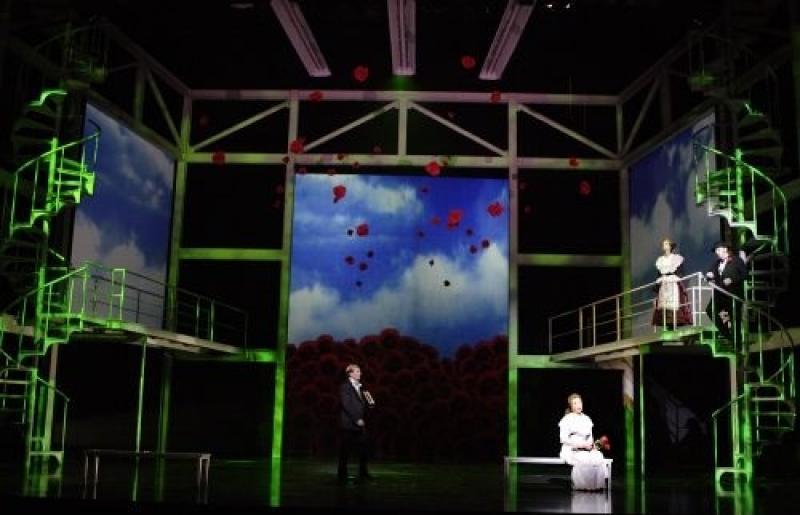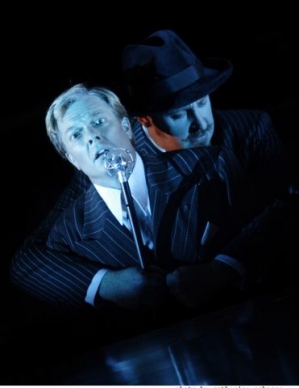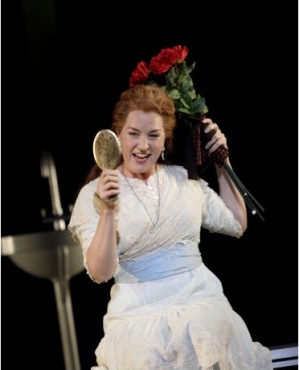Faust, English National Opera | reviews, news & interviews
Faust, English National Opera
Faust, English National Opera
McAnuff's updating baffles, while Spence, Patterson and Grevelius shine

Gounod's Faust is many things: vaudeville act, sentimental romance, Gothic tragedy, Catholic catechism, in short, a wholly unrealistic but winningly schizophrenic work that should be taken about as seriously as an episode of Sunset Beach.
But as well as being ambitious, it was also more than a little tasteless. That it wasn't a lot tasteless was down to the slipperiness of Faust's identity. McAnuff's Faust is seemingly a Nazi, a scientist working in the shadow of a blitzed Reichstag, about to make the final suicidal sacrifice.
 Unedifying, particularly as the opera lurched from grand opening statements to sentimental romance. Were we really meant to be absorbing the flutters of the heart of a Joseph Mengele? I hoped not and instead clung (as the clues started to hint in this direction) to the not much more savoury idea that we were instead following a nuclear physicist Faust, one who had fled Berlin and had joined the Manhattan Project. But oddities remained. Why the playing around with beakers? Who knows?
Unedifying, particularly as the opera lurched from grand opening statements to sentimental romance. Were we really meant to be absorbing the flutters of the heart of a Joseph Mengele? I hoped not and instead clung (as the clues started to hint in this direction) to the not much more savoury idea that we were instead following a nuclear physicist Faust, one who had fled Berlin and had joined the Manhattan Project. But oddities remained. Why the playing around with beakers? Who knows?
Bafflement resulted from McAnuff's breathless attempt to wed everything to an incoherent historic or scientific reality. Focus came briefly in Act Four with the arrival of a dirty, disabled, shell-shocked and incomplete regiment of German soldiers from the front of the First World War (the context of Faust's youth, to which he returns after his pact with Mephistopheles) singing the Soldier's Chorus. It movingly hollowed out the pomp of those famous martial oom-pahs to see a troop of damaged minds and bodies bellow this anthem.
But here I felt one could espy the source of McAnuff's downfall. This act's tragedies (all rather disjointed it has to be said) seem to have been his starting point. The rest of the opera (much of which is conceived in a completely different tone) appeared to be adapted to fit with this act's darkness. Consequently the fragrance of the first three acts was all but expunged - though, to be honest, very little of interest or sweetness or life was ever likely to grow from Robert Brill's leaden sets of stultifying functionality and unsightliness.
 However, it was worth making a Faustian pact with McAnuff's production if only for the music-making, all of which was very fine. Toby Spence's strong, thick voice held the course wonderfully as Faust, right to the bitter, beltering final trio. And for a character that was so weakly directed, he engaged us remarkably well (pictured above right with Iain Patterson).
However, it was worth making a Faustian pact with McAnuff's production if only for the music-making, all of which was very fine. Toby Spence's strong, thick voice held the course wonderfully as Faust, right to the bitter, beltering final trio. And for a character that was so weakly directed, he engaged us remarkably well (pictured above right with Iain Patterson).
Iain Patterson's Mephistopheles was certainly present vocally if a little absent in character. Anna Grevelius's Act Three aria as the puppyish Siebel sparkled. Melody Moore's vocal contribution as Marguerite (pictured left) - more comfortable as the put-upon mother than the coquette - was darker-hued but no less attractive. Benedict Nelson's Valentin flowered after a flat opening. Conductor Edward Gardner didn't do much with the orchestra except what was needed of them.
It's something McAnuff might have heeded: less is more. Cleverness is not rewarded in Faust. One simply needs to make peace with the jarring incongruities of this opera, and indulge the helter-skeltering melodramatic mammon.
- See what's on at English National Opera this season
Explore topics
Share this article
Add comment
The future of Arts Journalism
You can stop theartsdesk.com closing!
We urgently need financing to survive. Our fundraising drive has thus far raised £49,000 but we need to reach £100,000 or we will be forced to close. Please contribute here: https://gofund.me/c3f6033d
And if you can forward this information to anyone who might assist, we’d be grateful.

Subscribe to theartsdesk.com
Thank you for continuing to read our work on theartsdesk.com. For unlimited access to every article in its entirety, including our archive of more than 15,000 pieces, we're asking for £5 per month or £40 per year. We feel it's a very good deal, and hope you do too.
To take a subscription now simply click here.
And if you're looking for that extra gift for a friend or family member, why not treat them to a theartsdesk.com gift subscription?
more Opera
 Ariodante, Opéra Garnier, Paris review - a blast of Baroque beauty
A near-perfect night at the opera
Ariodante, Opéra Garnier, Paris review - a blast of Baroque beauty
A near-perfect night at the opera
 Cinderella/La Cenerentola, English National Opera review - the truth behind the tinsel
Appealing performances cut through hyperactive stagecraft
Cinderella/La Cenerentola, English National Opera review - the truth behind the tinsel
Appealing performances cut through hyperactive stagecraft
 Tosca, Royal Opera review - Ailyn Pérez steps in as the most vivid of divas
Jakub Hrůša’s multicoloured Puccini last night found a soprano to match
Tosca, Royal Opera review - Ailyn Pérez steps in as the most vivid of divas
Jakub Hrůša’s multicoloured Puccini last night found a soprano to match
 Tosca, Welsh National Opera review - a great company reduced to brilliance
The old warhorse made special by the basics
Tosca, Welsh National Opera review - a great company reduced to brilliance
The old warhorse made special by the basics
 BBC Proms: The Marriage of Figaro, Glyndebourne Festival review - merriment and menace
Strong Proms transfer for a robust and affecting show
BBC Proms: The Marriage of Figaro, Glyndebourne Festival review - merriment and menace
Strong Proms transfer for a robust and affecting show
 BBC Proms: Suor Angelica, LSO, Pappano review - earthly passion, heavenly grief
A Sister to remember blesses Puccini's convent tragedy
BBC Proms: Suor Angelica, LSO, Pappano review - earthly passion, heavenly grief
A Sister to remember blesses Puccini's convent tragedy
 Orpheus and Eurydice, Opera Queensland/SCO, Edinburgh International Festival 2025 review - dazzling, but distracting
Eye-popping acrobatics don’t always assist in Gluck’s quest for operatic truth
Orpheus and Eurydice, Opera Queensland/SCO, Edinburgh International Festival 2025 review - dazzling, but distracting
Eye-popping acrobatics don’t always assist in Gluck’s quest for operatic truth
 MARS, Irish National Opera review - silly space oddity with fun stretches
Cast, orchestra and production give Jennifer Walshe’s bold collage their all
MARS, Irish National Opera review - silly space oddity with fun stretches
Cast, orchestra and production give Jennifer Walshe’s bold collage their all
 Káťa Kabanová, Glyndebourne review - emotional concentration in a salle modulable
Janáček superbly done through or in spite of the symbolism
Káťa Kabanová, Glyndebourne review - emotional concentration in a salle modulable
Janáček superbly done through or in spite of the symbolism
 Buxton International Festival 2025 review - a lavish offering of smaller-scale work
Allison Cook stands out in a fascinating integrated double bill of Bernstein and Poulenc
Buxton International Festival 2025 review - a lavish offering of smaller-scale work
Allison Cook stands out in a fascinating integrated double bill of Bernstein and Poulenc
 Tosca, Clonter Opera review - beauty and integrity in miniature
Happy surprises and a convincing interpretation of Puccini for today
Tosca, Clonter Opera review - beauty and integrity in miniature
Happy surprises and a convincing interpretation of Puccini for today
 Hamlet, Buxton International Festival review - how to re-imagine re-imagined Shakespeare
Music comes first in very 19th century, very Romantic, very French operatic creation
Hamlet, Buxton International Festival review - how to re-imagine re-imagined Shakespeare
Music comes first in very 19th century, very Romantic, very French operatic creation

Comments
...
...
...